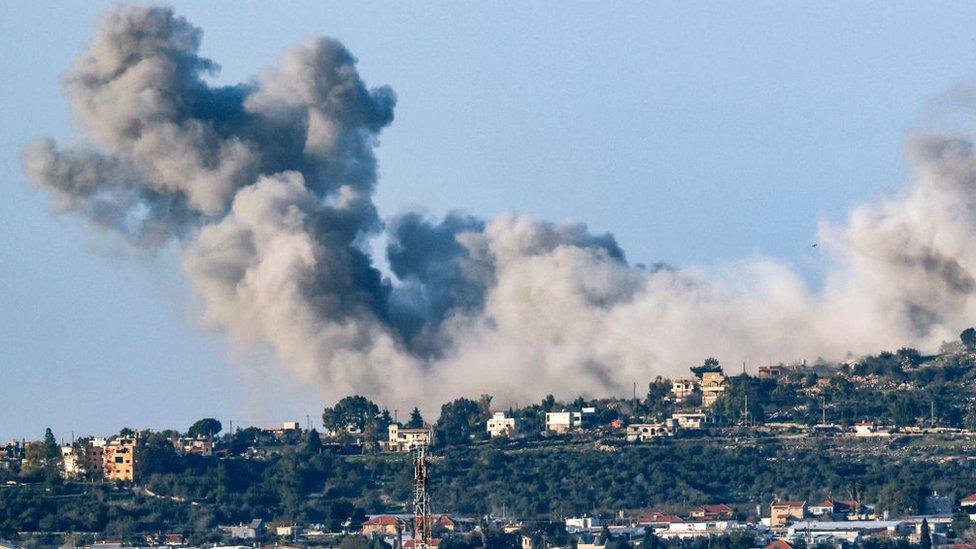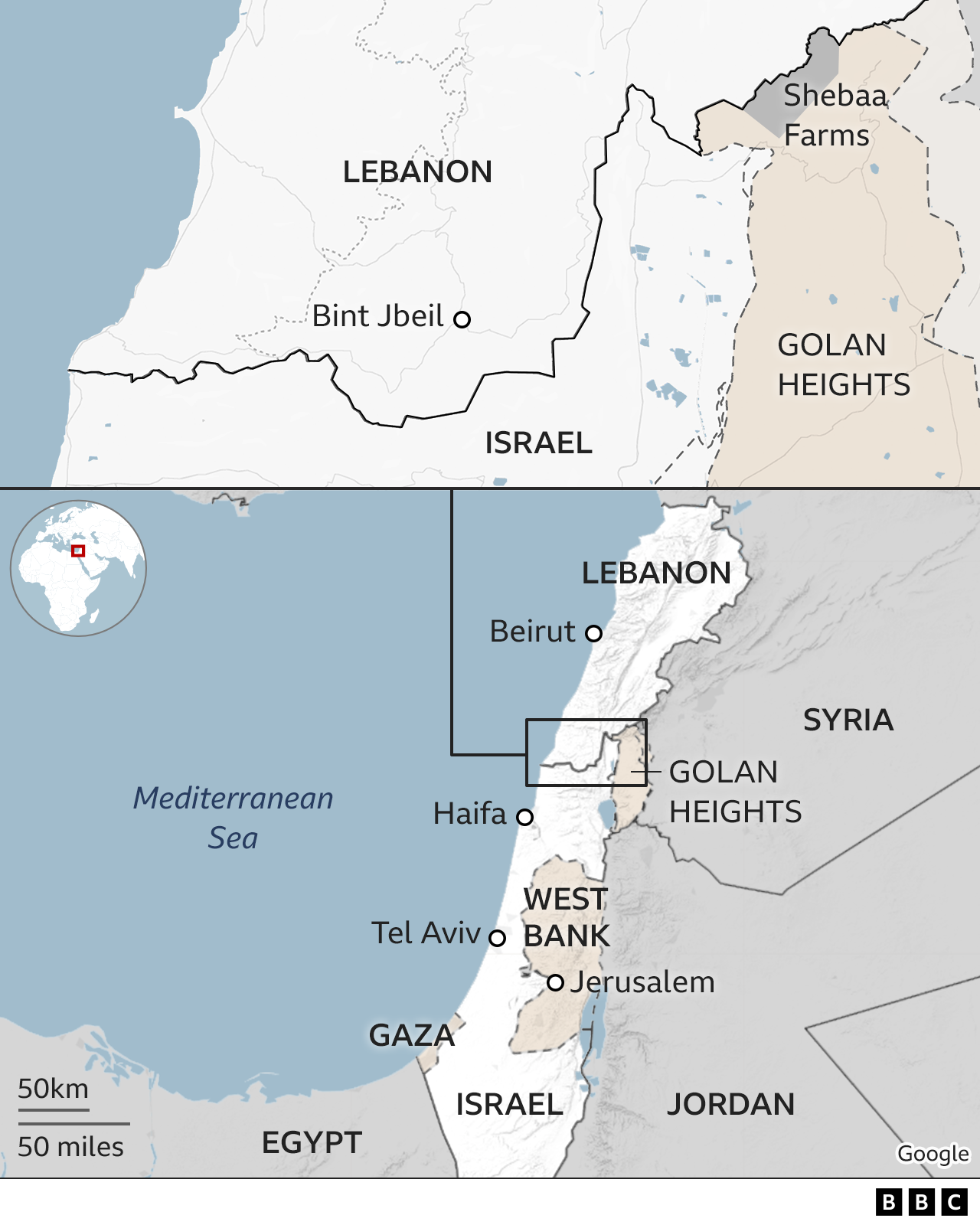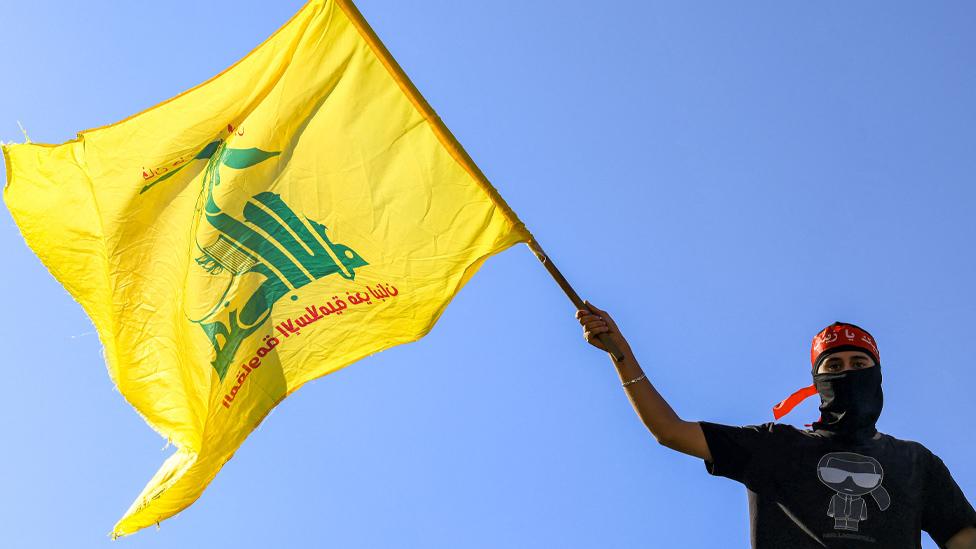Israel Gaza war: Israel warns Hezbollah and Lebanon over border fighting
- Published

Fighting on the Israeli-Lebanese border earlier this week
Israel will act to remove Hezbollah from the border with Lebanon if the militia group's attacks continue, an Israeli minister has warned.
Benny Gantz said the Israeli military would intervene if militants do not stop firing on northern Israel.
Time for a diplomatic solution was running out, he added.
Meanwhile, the head of the Israel Defense Forces said troops were in "very high readiness" for more fighting in the north.
"Our first task is to restore security and the sense of security to the residents in the north, and this will take time," Chief of the General Staff Lt Gen Herzi Halevi said, after conducting a "situational assessment".
Cross-border exchanges of fire have been escalating since Hamas's 7 October attacks on Israel.
On Wednesday, Hezbollah launched its highest number of cross-border attacks in a day since 8 October, security sources told Reuters.
It has led to concerns the conflict in Gaza could become wider across the region.
"The situation on Israel's northern border demands change," Mr Gantz told a news conference on Wednesday night.
"The stopwatch for a diplomatic solution is running out. If the world and the Lebanese government don't act in order to prevent the firing on Israel's northern residents, and to distance Hezbollah from the border, the IDF will do it."
But the Lebanese ambassador in the UK, Rami Mortada, said his country was on the receiving end of attacks and "the party that should hold back is Israel".
"We are not interested in escalation - all sides need to de-escalate," he told the BBC World Service's Newshour programme.
Earlier this month, Israeli Prime Minister Benjamin Netanyahu said on a visit to troops near the border that Israel would "single-handedly turn Beirut and South Lebanon, not far from here, into Gaza and Khan Yunis" if Hezbollah started an all-out war.
Hezbollah - a Shia Muslim organisation - is designated a terrorist organisation by Western states, Israel, Gulf Arab countries and the Arab League.
Funded by Iran, it is one of the most heavily-armed, non-state military forces in the world.
In 2006, a full-blown war between Hezbollah and Israel was triggered when Hezbollah carried out a deadly cross-border raid, with Israeli troops invading southern Lebanon.

At the border, there has been an increase in rocket fire and the use of weaponised drones by Hezbollah this week, with Israeli war planes quick to respond.
On Thursday, Israeli forces said they intercepted a drone crossing into their territory from Lebanon.
And on Wednesday, state media in Lebanon reported that a Hezbollah fighter and two of his relatives had been killed in an Israeli air strike.
The attack reportedly hit a house in Bint Jbeil, a town about 2km (1.2 miles) from the border with Israel.
A Hezbollah statement said one of the victims, Ibrahim Bazzi, was an Australian citizen visiting his family.
More than 100 people have been killed in Lebanon since October - most of them Hezbollah fighters but civilians, including three journalists, are also among the dead.
On the Israeli side, at least four civilians and nine soldiers are known to have died on the Lebanon border since hostilities began. Thousands of civilians living in dozens of communities in the area have been evacuated by the army.
Meanwhile, Unifil - the UN peacekeeping force that has operated in southern Lebanon since 1978 - called on Lebanese authorities to investigate after one of its troops was wounded in the country's south.
Unifil said a patrol was attacked "by a group of young men" in Taybeh, with a vehicle also damaged.
Hezbollah's leadership praised the unprecedented cross-border attack launched by Hamas gunmen on southern Israel on 7 October, in which at least 1,200 people were killed - most of them civilians - and about 240 others were taken hostage.
More than 21,100 people have been killed by Israeli forces in Gaza - mostly children and women - during 11 weeks of fighting, according to the Hamas-run health ministry.
Thousands of Palestinian families in Gaza are trying to find shelter as Israel broadens its ground offensive across the centre and south of the territory.
Related topics
- Published14 February
